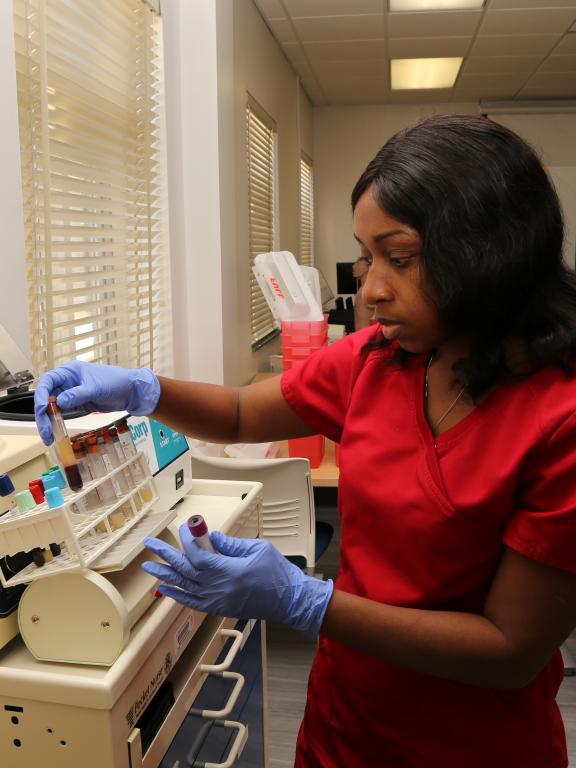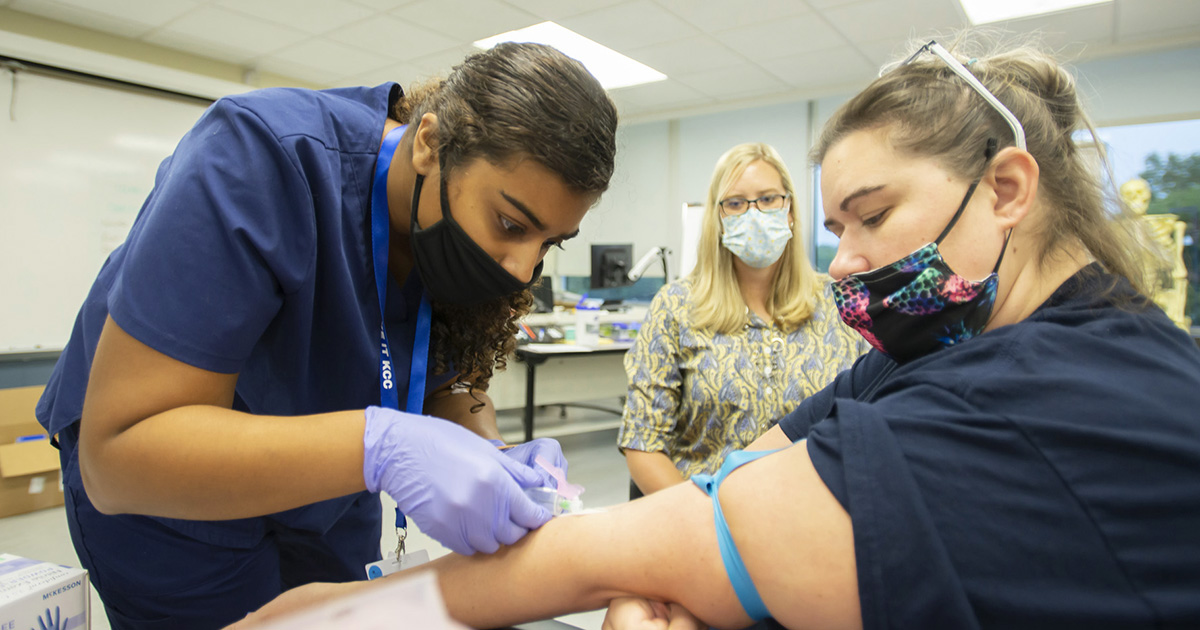What Makes High-Quality Phlebotomy Courses Near Me From the Rest?
What Makes High-Quality Phlebotomy Courses Near Me From the Rest?
Blog Article
What You Required to Know Before Starting a Phlebotomy Educating Course for Future Success
Prior to you begin a phlebotomy training program, it's important to comprehend what the role involves and the skills you'll need to do well. Researching accredited programs can set the foundation for your education, yet do not neglect the relevance of hands-on experience and interpersonal abilities. You'll also intend to consider certification demands certain to your state. What should you focus on in your preparation? Allow's discover the crucial factors that can form your future in this field. Phlebotomy school.
Understanding the Function of a Phlebotomist
Phlebotomists play a crucial function in the medical care system, as they're responsible for attracting blood examples for tests, transfusions, or donations. You'll find on your own functioning in numerous settings, like medical facilities, clinics, and research laboratories, where accuracy and expertise are important. Each day, you'll connect with patients, discussing treatments to ease their anxiousness, which assists develop trust fund and connection.
Your tasks consist of preparing devices, maintaining a sterilized atmosphere, and making sure exact labeling and documentation of examples. You'll also need to remain updated on security protocols and laws, as patient safety and security is non-negotiable. Phlebotomists usually collaborate with other health care professionals, adding to exact diagnoses and efficient therapy plans.
In this duty, you must be detail-oriented and efficient, in addition to possess a strong sense of compassion. Being a phlebotomist isn't simply regarding injuring; it's concerning making a positive influence on people' lives.
Key Abilities Needed for Success in Phlebotomy
To grow in phlebotomy, you'll require a mix of technical and interpersonal abilities that establish you besides others in the health care field (Phlebotomy Courses Near Me). First, understanding venipuncture techniques is crucial; you must fit with needles and find out to injure efficiently. Interest to information is necessary, as exact labeling and documents can considerably influence person care
Social abilities additionally play a vital role. You'll communicate with clients consistently, so being compassionate and approachable assists alleviate their anxiety. Excellent interaction skills are necessary for discussing treatments and making certain clients feel educated and secure.
Furthermore, time monitoring and organizational abilities will certainly maintain you efficient, especially in hectic health care settings. Staying upgraded on safety procedures and policies is non-negotiable to assure both your safety and that of your people. By refining these skills, you'll place on your own for success in the dynamic field of phlebotomy.
Picking the Right Phlebotomy Educating Program
Exactly how can you guarantee you're choosing the very best phlebotomy training program for your requirements? Start by looking into recognized programs in your area. Accreditation validates the program meets sector criteria and offers top quality education and learning. Inspect the curriculum to validate it covers important skills like venipuncture, patient interaction, and safety and security protocols.

A program that helps you safeguard a task post-training can give you a substantial benefit in your phlebotomy occupation. With these variables in mind, you'll locate a program that fits your objectives and sets you up for success.
Certification and Licensing Demands
When it concerns starting your phlebotomy occupation, understanding certification and licensing needs is necessary. Each state has details guidelines you require to comply with, so it is necessary to study what puts on you. Additionally, you'll need to browse the qualification examination process to assure you're completely certified.
State-Specific Laws
While going after a job in phlebotomy, understanding state-specific regulations for accreditation and licensing is important. Furthermore, some states might mandate a specific number of scientific hours or a specific degree of training prior to you can function as a phlebotomist. By knowing what's called for, you'll be better prepared to begin your phlebotomy profession successfully.
Qualification Test Process
As you prepare for a profession in phlebotomy, comprehending the qualification examination process is important to your success. First, research study the accrediting organizations, like the National Phlebotomy Association or the American Society of Phlebotomy Technicians. Each has specific requirements, including training, medical experience, and application costs. When you meet these requirements, you'll require to arrange your exam. It normally includes multiple-choice inquiries covering topics from makeup to security procedures. Research diligently making use of technique tests and review products. After passing, you'll receive your qualification, which improves your employability. Bear in mind, keeping your accreditation may call for continuing education or regular re-examinations, so remain educated regarding any kind of modifications in guidelines to guarantee your qualifications continue to be legitimate.
Job Market Overview for Phlebotomists
As you think about a profession in phlebotomy, it is essential to comprehend the job market overview. Need for skilled phlebotomists is on the increase, driven by the expanding medical care sector. You'll also need to know what income expectations to expect as you enter this gratifying area.
Employment Need Patterns
The work market for phlebotomists is anticipated to expand considerably in the coming years, driven by a boosting demand for clinical testing and the aging population. As health care centers increase and new labs open, you'll locate much more possibilities for employment. Phlebotomy school. Health centers, facilities, and blood contribution centers are proactively seeking qualified phlebotomists to meet the demands of clients requiring routine blood job and specialized tests. Additionally, innovations in clinical innovation are producing new testing techniques, further fueling need. With a concentrate on preventive care and very early medical diagnosis, your skills in phlebotomy will be necessary. Staying updated with accreditations and training can boost your employability and setting you positively in this expanding work market.
Wage Expectations Overview
Phlebotomists can expect a competitive wage that shows their abilities and the growing need in the medical care field. Typically, you may make in between $35,000 and $45,000 per year, depending upon your place, experience, and the center you help. In metropolitan locations, salaries often tend to be greater due to the cost of living and increased need for health care solutions. Furthermore, accreditation can enhance your earning possible, making you a much more eye-catching candidate. Numerous phlebotomists additionally delight in benefits such as health insurance coverage and retirement strategies, which can even more include to your overall compensation. As the market remains to broaden, work chances and income prospects for phlebotomists are most likely to boost, making this an appealing career selection.
Possible Career Paths and Development Opportunities
While seeking a phlebotomy training course, you could find a range of career paths and advancement possibilities that await you in the medical care field. As a qualified phlebotomist, you can work in healthcare facilities, blood donation facilities, or analysis laboratories. Each establishing deals unique experiences and challenges, enabling you to refine your skills.
You could additionally check out specializations, such as becoming a benefactor phlebotomy professional or a laboratory aide. These roles typically provide additional training and can cause greater salaries.
If you're going for innovation, think about seeking further education and learning in clinical innovation or nursing. This can open up doors to Phlebotomy Training Course managerial functions and even clinical management settings. Networking within the medical care neighborhood can also help you reveal job openings and mentorship opportunities. Embrace these opportunities, and you'll find that your phlebotomy job can advance in interesting methods.
Tips for Doing Well in Phlebotomy Training and Beyond

Technique makes ideal, so take advantage of any hands-on opportunities. Acquaint yourself with different strategies and equipment to construct your confidence. Maintain a favorable perspective, as your frame of mind can greatly influence your efficiency.
Connect with industry specialists and look for mentorship; this can lead to valuable insights and task opportunities after college graduation. Finally, take into consideration proceeding education or qualifications to enhance your skills and remain upgraded in the field. By adhering to these ideas, you'll not only be successful in your training but additionally lay a solid foundation for a gratifying profession in phlebotomy.
Often Asked Concerns
What Is the Average Cost of Phlebotomy Training Programs?
The average expense of phlebotomy training programs typically ranges from $700 to $2,500, depending on the organization and place. You ought to investigate different alternatives to find a program that fits your spending plan and demands.
How Lengthy Does Phlebotomy Training Generally Take to Full?

Exist Age Restrictions for Enrolling in Phlebotomy Courses?
There aren't strict age constraints for phlebotomy courses, but many programs require you to be at least 18. Some may accept younger trainees with adult approval or if you're registered in an associated instructional program.
Can I Function While Going To Phlebotomy Training?
Yes, you can work while going to phlebotomy training. Many pupils handle part-time work along with their studies. Simply see to it to balance your timetable effectively, so you can concentrate on both work and your training.
What Product Do I Required for Phlebotomy Training?
For phlebotomy training, you'll need personal safety devices like gloves and masks, lab layers, a sharps container, alcohol wipes, needles, and blood collection tubes. See to it you've got whatever prepared before your first-rate starts.
Report this page